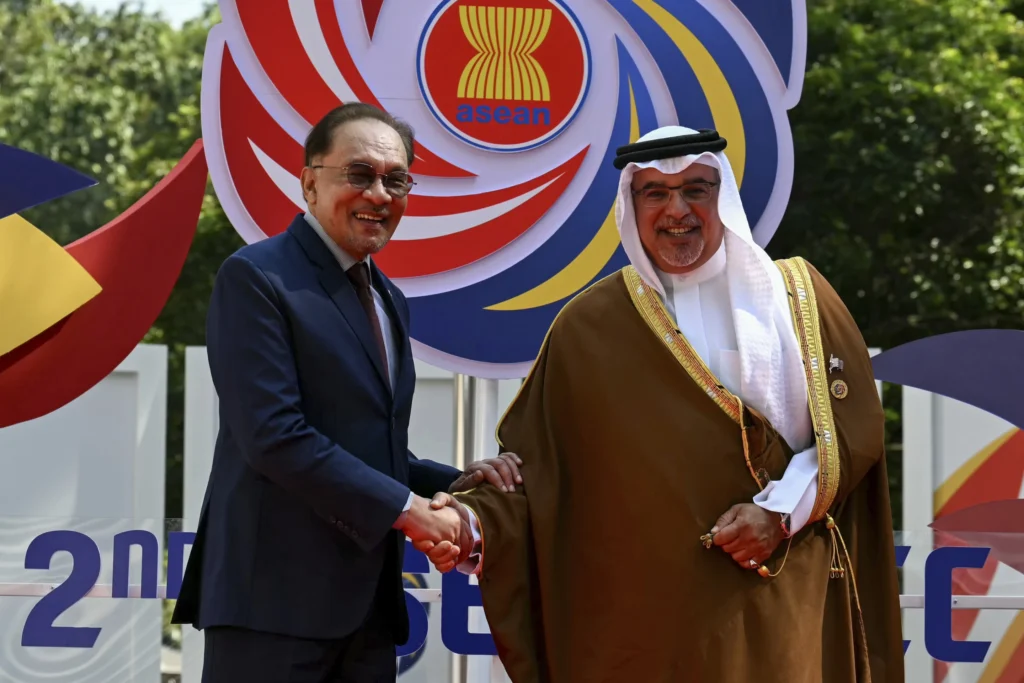The Association of Southeast Asian nations (ASEAN) is set to hold a three-way summit with China and six Gulf countries.
This is ASEAN’s first summit with China and the Gulf Cooperation Council (GCC) in a sign of its readiness to embrace new markets.
Chinese Premier, Li Qiang will join the two blocs in their first such meeting, as Beijing seeks to present itself as a reliable ally to the region.

Malaysian Prime Minister, Anwar Ibrahim, opening a summit in Kuala Lumpur between the 10-member Association of Southeast Asian Nations and the Gulf Cooperation Council, said that a stronger ASEAN-GCC relationship would be key to enhancing interregional collaboration, building resilience and securing sustainable prosperity.
“I believe the ASEAN-GCC partnership has never been more important than it is today, as we navigate an increasingly complex global landscape marked by economic uncertainty and geopolitical challenges.”
Anwar Ibrahim
Malaysia is the current Chair of ASEAN, which also includes Brunei, Cambodia, Laos, Myanmar, the Philippines, Singapore, Thailand and Vietnam.

Kuwait’s Crown Prince, Sheikh Sabah Khalid Al Sabah said the two blocs, which held their first summit in Riyadh in 2023, would build on their momentum to deepen cooperation and “improve our ability to face crisis.”
He stated that the GCC is ASEAN’s seventh largest trade partner, with total trade reaching $130.7 billion in 2023.
The GCC comprises the oil-producing nations of Bahrain, Kuwait, Oman, Qatar, Saudi Arabia and the United Arab Emirates.
Anwar said last week that the GCC already has strong links with the U.S. and “wants to be close to China too.”
ASEAN has maintained a policy of neutrality, engaging both Beijing and the United States, but U.S. President Donald Trump’s threats sweeping tariffs came as a blow.

Six of the bloc’s members were among the worst hit, with tariffs between 32% and 49%.
Trump announced a 90-day pause on tariffs in April for most of the world, and this month struck a similar deal with key rival China, easing trade war tensions. Anwar is seeking an ASEAN summit with Trump on the tariffs.
Malaysia is nudging the United States to negotiate tariffs with ASEAN as a single trading bloc, as Southeast Asia’s leaders express “deep concern” over Washington’s unilateral levies that threaten to disrupt growth in their trade-reliant economies.
Yesterday, Anwar said that he had written to Trump “to seek his understanding to organise a US-ASEAN meeting, which shows we observe seriously the spirit of centrality.”

ASEAN Seen As Tilting Towards China
Collins Chong Yew Keat, a foreign affairs, strategy and security Analyst with Universiti Malaya, opined that ASEAN is seen as tilting towards China and has failed to take strong action against Beijing’s aggression in the disputed South China Sea.
ASEAN members; Vietnam, the Philippines, Malaysia and Brunei have overlapping claims with China, which asserts sovereignty over almost the entire South China Sea.
Chong added that while relying on US defense support, ASEAN is increasing reliance and partnership with China and other US rivals.
“If this continues under the current Trump administration, it will create further room for Washington to distance itself from the region, which will spell disaster and create an even deeper Chinese presence.”
Collins Chong Yew Keat
Meanwhile, Adib Zalkapli, Managing Director of geopolitical and public policy advisory firm Viewfinder Global Affairs, predicted that the current trade turmoil would have a lasting effect on ASEAN.
“It won’t happen overnight or even at the end of Malaysian chairmanship, but the American ‘Liberation Day’ tariffs have certainly forced ASEAN to rethink its role and its approach in protecting the interests of the member states.”
Adib Zalkapli
Trade and economic upheaval caused by US tariffs has pushed the 10-member ASEAN bloc to pursue trade deals with non-US partners and increase intra-bloc trade and business cooperation.
READ ALSO: Range Limits On Western-Supplied Arms To Ukraine Removed



















